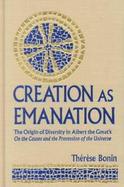Creation as Emanation the Origin of Diversity in Albert the Great's on the Causes and the Procession of the Universe
- Binding: Hardcover
- Publisher: Univ of Notre Dame Pr
- Publish date: 07/01/2001
To do so was to invite controversy, since accidents of translation had made many readers think that The Book of Causes taught that God made only the first creature, which in turn created the diverse multitude of lesser things. Thus, Albert's contemporaries in the Christian West took the text to uphold the supposedly Aristotelian doctrine that from the One only one thing can emanate -- a doctrine they rejected, believing as they did that God freely determined the number and kinds of creatures. Albert, however, defended the philosophers against the theologians of his day, denying that the thesis "from the One only one proceeds" removed God's causality from the diversity and multiplicity of our world. This Albert did by appealing to a greater theologian, Pseudo-Dionysius the Areopagite, and equating the being which is the subject of metaphysics with the procession of Being from God's intellect, a procession Dionysius described in On the Divine Names.
Creation as Emanation examines Albert's reading of The Book of Causes with an eye toward two questions: First, how does Albert view the relation between faith and reason, so that he can identify creation from nothing with emanation from God? And second, how does he understand Platonism and Aristotelianism, so that he can avoid the misreadings of his fellow theologians byfinding in a late-fifth-century Neoplatonist the key to Aristotle's meaning?
| Seller | Condition | Comments | Price |
|
4 The World Resource Dist.
|
Like New
|
$33.75
|


